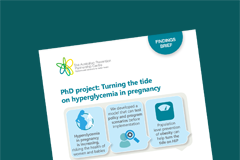PhD project: Turning the tide on hyperglycemia in pregnancy
This project brought together researchers, clinicians, and policy makers to develop collaboratively a novel, multi-scale model for hyperglycemia in pregnancy using the best available evidence and data. Download the Findings Brief PDF to learn more about what this project found and the relevance for policy and practice.
Key messages
- Hyperglycemia in pregnancy (HIP, including gestational diabetes and pre-existing type 1 and type 2 diabetes) is increasing, with associated risks to the health of women and their babies.
- Population health interventions to prevent obesity across the lifecourse will be key to helping stabilise and reduce HIP.
- Interventions targeting high-risk individuals for HIP, can be beneficial for individuals, however they delivered small reductions in overall population incidence rates.
- Dynamic simulation models (DSM) can test policy and program scenarios before implementation in the real world.
- DSMs mature as new evidence becomes available and methods are advanced to facilitate further development.
- The impact of maternal weight status interventions on incidence of HIP were the first scenarios explored using this advanced DSM.
